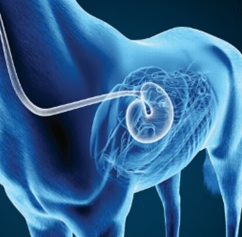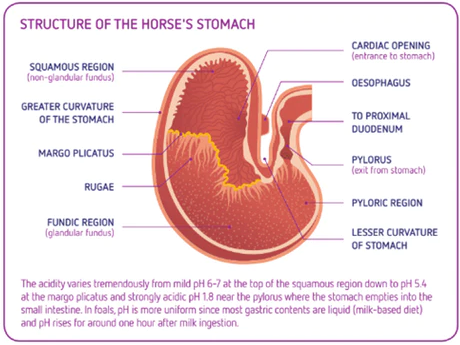Understanding Gastric Ulcers
Posted by The Vet Group on
What are the signs of gastric ulcers?
The indications of gastric ulcers are frequently ambiguous and non-specific, but commonly reported symptoms include:
- Behavioral changes, such as irritability
- Colic
- Lethargy
- Poor performance
- Poor body condition
- To diagnose gastric ulceration, a veterinarian will conduct a gastroscopy.

How prevalent is gastric ulceration?
Gastric ulcers pose a significant concern for competitive horses. In racing horses, Equine Squamous Gastric Disease (ESGD) is frequently identified, with some studies indicating that 80-100% of horses in training may be affected. Endurance horses during the competition season may exhibit ESGD in 66-93% of cases. Horses at home, rarely participating in competitions or leaving the stable, have the lowest risk of ESGD, with only 11% reported to be affected. Equine Glandular Gastric Disease (EGGD) is less understood, but one study found that 54% of leisure horses and 64% of sport horses had glandular ulceration. EGUS not only impacts performance but also compromises the horse's welfare, necessitating comprehensive efforts to ensure the comfort and well-being of our equine companions.

How can you reduce the risk of gastric ulcers?
Effective management and stress reduction are crucial, with dietary choices playing a pivotal role.
To minimise the risk of gastric ulcers, consider the following recommendations:
- Ensure continuous access to pasture or forage (consult your veterinarian or nutritionist for advice if your horse has weight concerns or follows a specific diet).
- Feed a small amount of forage or chaff to your horse 30 minutes before exercise to mitigate acid splashing.
- Limit starch/grain intake, ensuring each meal is appropriately sized. Replacing some starch-based calories with vegetable oil, such as Equine America Supreme Omega Oil, may be suitable. Seek advice from your nutritionist or veterinarian based on your horse's specific needs.
- Encourage natural foraging behavior by offering forage in different locations within the stable.
- Maintain constant access to water.
- Stick to a routine and minimize changes in management.
- Reduce social stressors, such as interactions with aggressive stablemates.
- Ensure your horse has suitable companionship.
- Consider supplements like Uls-Gard Pellets
- These suggestions are general, and specific advice for your horse should be obtained from your veterinarian and/or equine nutritionist.
More details on Equine America Uls-Gard Pellets:
Uls-Gard is formulated to uphold digestive health and comfort through soothing and protective ingredients for the stomach. Visit the product pages on the website for additional information on the key active ingredients in these products.
Reference:
Sykes et al. (2015) ECEIM Consensus Statement – Equine Gastric Ulcer Syndrome in Adult Horses & Equine America UK
